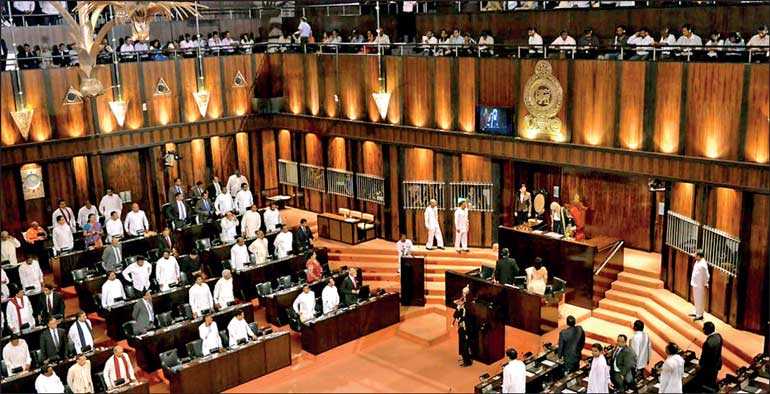Friday Feb 20, 2026
Friday Feb 20, 2026
Friday, 23 October 2020 00:00 - - {{hitsCtrl.values.hits}}

Are we in the period of reverse transition from being a democracy regressing towards an oligarchy and, finally, to a modern monarchy via the sophistry of the 20th Amendment?
The challenge that the 20th Amendment presents rests more on principled politics and less on juridical intervention as was experienced by the recent Supreme Court determination. The Judiciary cannot do  much.
much.
The Government claims it has the two-thirds majority. The purpose of this column is to appeal to the conscience (a rare quality but need to be said) of the politicians for the greater benefit of the country and its people. Some may laugh. Never mind.
This is not about which party, which symbol or which person. This is about democracy, sovereignty of the people and the Parliament, rule of law, independence of the Judiciary and governance. Was the ancient Greek philosopher Plato prophetic when he famously said: “O, men of Athens, if I was engaged in politics, I would have perished long ago and done no good either to you or to myself”?
Having closely followed the trial of his teacher Socrates and the death sentence passed on him, Plato was disappointed with the so-called Athenian democracy. Around that time, Aristotle in his treatise, ‘Politics’ distinguished the forms of ruling as by One (meaning the Monarch), by the Few (meaning the Oligarchy, Aristocracy) and by the Many (Democracy).
Are we in the period of reverse transition from being a democracy regressing towards an oligarchy and, finally, to a modern monarchy via the sophistry of the 20th Amendment?
Concentration of power
The problem is unified authority under one single office introduces the risk of tyranny and potential abuse of power. The solution for this is the dispersal of power in a workable format and not the extreme action of effectively removing the existing checks and balances.
Prof. Aileen Kavanagh is of the view that “if the sole purpose is to ensure that powers are checked and monitored, then we can satisfy this goal by putting institutional checks in place, without worrying about the basis of the original power allocation” (The Constitutional Separation of Powers, Oxford Law Faculty). Beginning from Montesquieu, the emphasis to avert the concentration of power has today become part of the principles of constitutional jurisprudence.
In the inspiring words of Statesman and Philosopher James Madison: “In order to avert the risk of abuse of power we must so contrive the interior structure of the Government as that its several constituent parts may, by their mutual relations, be the means of keeping each other in their proper places” (No. 51; in C. Rossiter (ed), The Federalist Papers).
Moving away from the concentration of power and expanding the scope of accountability in good governance, the Indian Supreme Court said: “…traditionally the checks and balances dimension were only associated with governmental excesses and violations.
“But in today’s world of positive rights and justifiable social and economic entitlements, hybrid administrative bodies, private functionaries discharging public functions, we have to perform the oversight function with more urgency and enlarge the field of checks and balances to include governmental inaction.” (Dr. Ashwini Kumar vs Union of India Ministry of Home (619, para 83) (2019).
Resist or surrender?
The judicial willingness of the Indian judges to expand the embrace of modern constitutional jurisprudence to greater transparency, accountability and dispersal of power is a positive development. Lessons for us to learn.
In contrast, the 20th Amendment Bill is aimed at constricting the monitoring mechanisms and the inbuilt checks and balances. It is a serious regression in this age of progressive constitutional democracy. What is the role of our politicians in keeping with this change vis-a-vis the 20th Amendment?
Will they resist or surrender? They need to think sincerely about the impact their decision will have not only for today but for the future generations. Think seriously about their own future as politicians. Would they like to submit their ‘selves’ or be an independent person having their own say? The politicians have two options to choose from. Firstly, the progressive approach. Secondly, the retrogressive path.
Lessons from Plato to our politicians. Plato confesses to his intense feeling of shame of the times he found himself in. People had abandoned the true principles of Government and were reluctant to return to the right track. He called those who succumbed to unconscientious behaviour as cowards and those who refused to follow the wrong path as brave men.
Can those who voted at the last elections rely on their representatives to decide using their conscience when it comes to voting for the 20th Amendment Bill? Will they be among the cowards or the brave like the people who Plato identified during his period?
Prudent politicians with a minimum of social conscience, self-integrity and morality should be able to see and judge the value of the 20th Amendment to the country and its future. It is worth to remind ourselves of what Montesquieu said in ‘The Spirit of the Laws’: “Every man interested with power is apt to abuse it, and to carry his authority as far it will go.”
In a letter to Mahatma Gandhi, Nehru once wrote: “Ordinary politicians have no principles to stand by and their work is governed by day-to-day opportunism.” There are people who are conscientious but not so conscientious. Those who are scrupulous but malleable. There are also principled persons but pliant. How many conduct themselves guided by or, in conformity to one’s own conscience, self-dignity and with integrity is anyone’s guess?
Constitutional obligations
Though not justiciable, look at some of the Directive Principles in the Sri Lankan Constitution in Chapter VI. Article 27 (1) refers to ‘laws and policies’ that will guide the establishment of a ‘just and free society’.
How can this be achieved under the proposed Bill? For example, the President has the power to directly make appointments to the Human Rights Commission of Sri Lanka and the Commission to Investigate Allegations of Bribery or Corruption. Will the Commissioners feel free and independent to inquire into any complaints involving the Government or officials close to the authorities?
Article 27 (2) (a) reads: “The full realisation of the fundamental rights of all persons.” This does not match with the removal in the 20th Amendment of the right of any person, to apply to the Supreme Court against the Attorney General under 126. A clear erosion of the fundamental rights of a person.
Article 27 (4) states that the State shall ‘strengthen and broaden’ the democratic ‘structures of government’ and the democratic rights of the people. Consider this in the light of the weakening of the democratic structures already in place like the Constitutional Council, the various Commissions, urgent bills, dissolution of Parliament, reducing the number of days for recourse to courts after a bill is gazetted etc.
The Supreme Court of India said: “In a democracy governed by the Constitution the sovereignty vests in the people and the State is obliged to discharge its constitutional obligations contained in the Directive Principles of the State Policy in Part -IV of the Constitution of India.” (State Of U.P vs Jai Bir Singh on 5 May 2005).
If there are shortcomings in the 19th Amendment, it is alright to make changes to ensure its administration, implementation and co-ordination efficient. The integrity on limitations in the 19th Amendment is not to be rewritten in a manner which will lose its purpose and compromise the sovereign intent.
So, then, the conscience, integrity and morality of our politicians have now been put to the test by the 20th Amendment Bill. An opportunity for the public to make a clear judgment about the ‘who’s who’, based on the outcome.
(The writer holds an LLB (Hons) U.K. and is an Attorney at Law.)